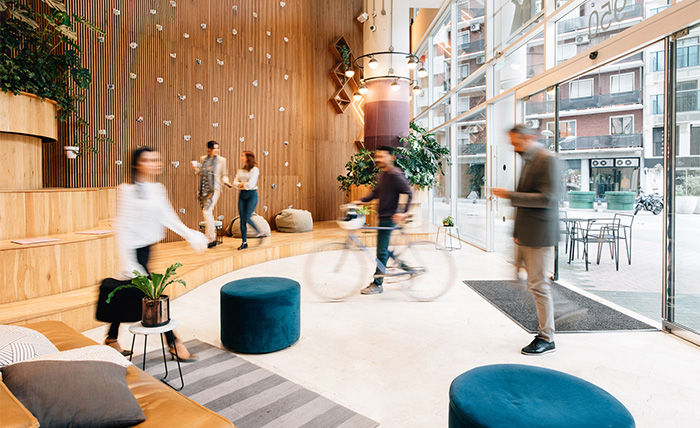
What is co-living? Simply put, it is a shared living space, providing good quality rental accommodation in cities designed to appeal to young professionals, combining private space and communal living areas with flexible terms.
Many renters would have experienced a similar model if they attended university and lived in Purpose Built Student Accommodation (PBSA).
Typically, the model works by offering a private bedroom and bathroom with shared kitchens and working and living space areas which may include amenities such as gyms, cinema rooms, bars, and even swimming pools.
Buildings are usually owned and managed by co-living companies and offer an increasingly mobile generation short-term and flexible rental contracts.
In many high-priced cities such as London, communal living is increasing, with young people attracted to the concept because often, costs are lower. They are also drawn to the convenience and a sense of fostering community.
The trend can also be viewed as a requirement borne from rising house prices, social isolation, and the poorer quality of alternative options.
As a property type, the model offers a more land efficient alternative to traditional residential accommodation, enabling developers to build more units per plot.
Could co-living be the premier investment of the future?
There is a clear and growing demand to create space combined with our increasingly refined lifestyle requirements and a more fluid labour market in certain locations.
While the co-living market is considered in its infancy in the UK, there is growing momentum behind the sector, with Manchester having c.£450m worth of co-living schemes currently in the development pipeline.
Globally, we continue to experience rapid urbanisation which in turn will see rising house prices, shrinking living space, and paradoxically, perhaps social disconnect.
Co-living may not be the sole or obvious solution. However, we must indeed consider this ever-growing segment as an alternative means of living for a growing demographic.
The European Commissions’ report (EC, 2021) notes that by 2030, almost 70% of the world’s population will be living in urban areas and more specifically across forty megacities, including London, which in turn may encourage investment activity within the sector – supporting the increasing demand for housing in cities.
The long-term sustainability of co-living
There is a clear correlation with the performance of the student market and co-living market.
Co-living schemes are seen as the accommodation bridge for graduates who are just beginning their careers, which in turn is supported by the continued resilience of the PBSA sector, which benefits from a similar operating model.
Even throughout the pandemic, investor demand has been robust, supported in part by growing student numbers.
The Higher Education Statistics Agency (HESA) are reporting record highs in new applications for full time undergraduate programmes in 2021 at 750,000. More interestingly, despite COVID-19 concerns, 2021 was a record year for overseas student applications (HESA, 2021)
Co-living companies have been quite resilient in maintaining great living environments for their residents despite the numerous challenges posed by the pandemic.
One of the perceived benefits of co-living is its role in fighting loneliness and promoting wellbeing which has significantly helped the global industry to be resilient during the pandemic.
However, unlike the PBSA sector, co-living benefits from non-cyclical factors such as urbanisation, increasing house prices, and most importantly an increasingly discerning market.
As house prices continue to rise, more young professionals are opting for the shared housing accommodation model.
Additionally, millennials and young professionals are attracted to the instant support network of potentially like-minded professionals in a city centre environment. This, along with the combination of quality accommodation and flexible terms on offer, also attracts people from around the world to come and work in the UK.
Asset Transformation
The co-living sector as a whole has weathered the pandemic extremely well when compared with other real estate investments, such as the hotel and office sectors which were put under an enormous amount of pressure during this time.
As a result of the pandemic and changes in strategy, the possibility of converting distressed real estate assets, such as hotels and offices may prove to be more economically viable which may in turn lead to a shift from investing in in the hospitality sector to co-living.
Advantages and disadvantages of co-living schemes
Positives
- All-inclusive monthly fee which often includes council tax, internet, laundry, etc.
- Networking with like-minded people with emphasis on community building
- Flexible tenancies ranging from days to months
- Apartments furnished to a very high specification
- Often no upfront deposits required.
Negatives
- Small and compact room sizes
- Rental prices cascade down depending on length of stay. Therefore, shorter term stays can be expensive.
If you are seeking financing options for co-living schemes, please do enquire with our Real Estate team.
Related Articles

The appeal of the coworking office – Part 1
We sit down with independent office space provider, Venaspace, commercial property provider, Bruntwood Works, and our own banking team to hear how the coworking office fared during lockdown.

The appeal of the coworking office – Part 2
For part 2 in our 2-part series on the coworking office space, we hear the views of independent office space provider, Venaspace, and commercial property provider, Bruntwood Works, on the future of coworking.
Becoming a client
Take control of your finances today by completing our enquiry form. Alternatively, you can call us on the number below and one of our team will be more than happy to talk about your future.
Brochures & email subscriptions
Request a brochure, or subscribe to our email updates.
